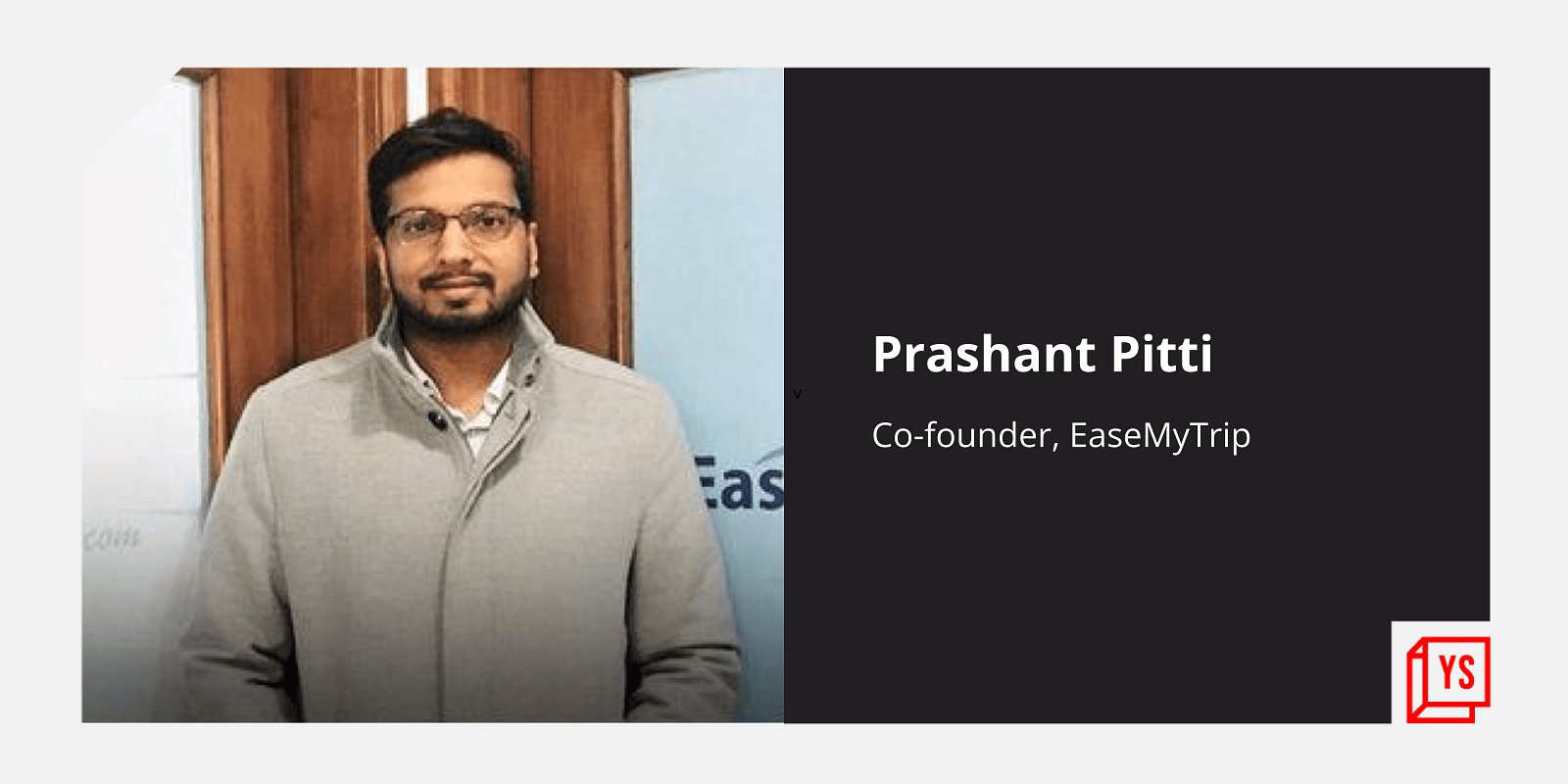COVID-19 brought the travel and tourism industry across the world to a standstill, which saw many hospitality businesses and companies operating in the space struggling to survive in one of its roughest times. But Delhi-headquartered and its overseas offices in Singapore, Dubai, Maldives, and Bangkok remained steady.
“The company did business of about Rs 4,400 crore in FY20, which halved in FY21 to Rs 2,100-2,200 crore but remained profitable throughout. In fact, we are one of the very rare travel technology companies that remained profitable even an impacted by COVID-19, and I think that’s like passing a litmus test,” EaseMyTrip founder Prashant Pitti said in a conversation with Siddhartha Ahluwalia, Founder and Host of 100x Entrepreneur Podcast.
Exactly 13 years ago in 2008, when the world was witnessing the Great Recession, Prashant and his brothers – Nishant Pitti and Rikant Pitti – started a mom and pop travel agency. Soon, the sibling trio went on to solve the pain points of at least 11,000 travel agents as a B2B venture for the first three years before pivoting to become a customer-facing business – which now contributes to 93 percent of the business.
Today, without raising external funds from venture capitalists or private equity, the startup sailed straight from bootstrapping to the bourses.
Surviving the pandemic
Prashant said the company’s efficiency and resilience with a focus on strong unit economics stood out during the pandemic when its competitors were dealing with distress sales. “We have built such a lean, efficient company that even COVID-19 could not stop us from being profitable,” he said.
So what did they do so differently? The entrepreneur took ‘gutsy decisions’ to fulfil customer needs.
With many customers having already booked tickets before the pandemic struck, they started asking for refunds as many were under financial distress. However, many travel portals were waiting for airlines to process the refunds, which they couldn’t as many aircraft were on the ground.
This prompted EaseMyTrip to tap into the Rs 150 crore cash reserves and refund the consumers before the airlines could sort out the compensation, even though there was a risk of airlines going bankrupt. When the lockdown rules were relaxed and business resumed, the company received the refunds.
“Because of this, there was a huge uproar on social media, where people were tagging our competitors and saying that ‘hey, my friend got money from EaseMyTrip, where is my money?’ There was nothing wrong from the competitor’s side because nobody got the money then but that definitely created a humongous amount of goodwill for us during the pandemic,” Prashant explained.
When the second wave hit India, the team realised that people want to travel but were scared about quarantine and other norms. “We then came up with a very unique service where if they had to cancel tickets later due to medical reasons, they would just need to upload a doctor’s prescription and get the full refund, including the money which the airline deducts, and this service was provided free of cost to everybody,” he said.
In its initial days of pivoting to serve directly to customers online, EaseMyTrip stood out by doing away with convenience fees to win customer loyalty, which enabled it to grow by word of mouth.
Prashant Pitti,Nishant Pitti, and Rikant Pitti
Foraying into the public market
EaseMyTrip became the first online travel agency to go public, which Prashant said “was almost unfathomable for most startups.”
The reason was that the Indian market places high value on profitability and the company was growing at a rapid pace year after year. “Bootstrapped so far, we felt pretty convinced that we don’t have to take the VC money anymore, since the business is anyways growing without any capital requirement…with the profitability; we thought we would be welcomed,” he said.
With an opening of Rs 180 per share on March 19, 2021, it is now traded for Rs 520 per share as of December 29, 2021. As a token of thanks to its employees, the company has offered them reserved stock units that can be liquidated anytime.
To know more, listen to the entire podcast here.
01:02 – Starting a travel venture during the recession
02:52 – Problem statement solved by EaseMyTrip for travel agents
05:49 – Impact on growth because of not charging “convenience fees”
07:44 – Being extremely efficient and disciplined as a company
13:41 – Decision behind going public
16:59 – How did EaseMyTrip remain profitable even during COVID-19?
25:31 – Why does EaseMyTrip prefer hiring non-IITians?










